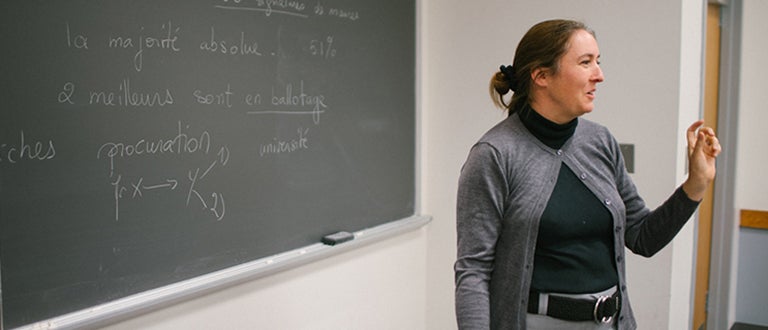Teletandem Teaching: Connecting Georgetown and France

Professor Alissa Webel incorporates teletandem teaching into her courses at Georgetown, connecting her students with peers at French universities. Photo by Kuna Malik Hamad.
October 27, 2015—Pen pals may have gone digital long ago, but new teletandem courses can connect students from all over the world for face-to-face conversation.
In teletandem courses, Georgetown language students spend time each week talking with a partner, who is learning American English, over Skype or video chat. Each session, the students spend time speaking in both languages.
Assistant Teaching Professor of French Alissa Webel has incorporated teletandem work in her courses through an ITEL (Initiative on Technology-Enhanced Learning) grant. Webel’s courses are part of a larger ITEL project in the Faculty of Language and Linguistics (FLL). Six FLL departments are using teletandem to connect Georgetown students with peers at universities in Brazil, Mexico, France, Italy, Turkey, Russia, Jordan, and Japan.
The Teletandem ITEL Project is an extension of Associate Professor Michael Ferreira’s work with Portuguese courses, which he began in 2008 with Professor João Telles at the State University of São Paulo-Assis. “There were two main reasons to incorporate teletandem in foreign language classes: to compare the benefits of learning via online interaction when compared to traditional classroom exposure through research and data-gathering as well as to improve intercultural competence,” Ferreira said. “Not to mention that students overall love the experience,” Ferreira continued.
Webel began using teletandem teaching in her Intermediate Intensive French (FREN-032) course in the fall of 2014. She then developed a teletandem component for her French for Politics (FREN-294) course last spring. For Intermediate Intensive French, Webel uses a traditional teletandem model and partners with a professor at the University of Lille in northern France. Each student is assigned a partner at the other university, and the students schedule time outside of class to talk in English and French on a weekly basis. While Georgetown students gain valuable experience practicing their conversation skills, their partners in Lille have a specific focus on developing both speaking and teaching skills. “The French students are future language teachers trying to perfect their English,” Webel explained.
For her French for Politics course, Webel worked with a professor of American politics at Sciences Po Lyon to create a new type of teletandem course. In this class, the goal goes beyond speaking. Her students write a 2,000-word article in the target language over the course of the semester. “The traditional teleroute is that the process is primary,” Webel said. “For French for Politics, it’s the culture and engagement that we are focusing on.”
The professors pair groups of students to act as editors for one another. “The Americans are writing in French, but being edited and advised in their writing process by the French students,” Webel continued. “They indirectly learn about the difference in academic styles of writing articles.”
Beyond improving their writing skills, Webel’s students learn about differences in structure and argumentation, or “how to write a French paper, the French way,” she said. “I can try to tell my students, ‘This is how its done,’ but they are experiencing it with students over there.”
At the end of the semester, the students publish their articles online. Georgetown and Sciences Po Lyon have a webpage, called POGU, on Bully Pulpit, a French website that hosts discussions about American culture and politics. “The reason why the political class is so novel is because there is an end product, and therefore the process is only secondary. It’s essential, but secondary,” Webel said.
Through her teletandem courses, Webel has had the opportunity to collaborate with professors abroad and other FLL professors, who have had different experiences setting up teletandem courses with other countries. These collaborations have allowed her to identify the best ways to use technology in foreign language programs. “When it comes to language, machines aren’t going to replace a teacher,” Webel said. “The key for me is learning how to use technology intelligently, not as a substitute but as an addition. That’s the balance we need to have.”
ITEL grants support professors integrating new technology in the classroom, but the grants also allow professors to conduct research on which teaching methods are most effective. So far, Webel has studied what her intensive-language students gain in comparison to a control group. “Eight sessions revealed that the significant difference in learning was not measurable,” Webel said. Teletandem students did not show measurable improvement in grammar or words per minute while speaking. “What was measurable was the perceived gain in confidence, which in itself is huge!” Webel said. “The perceived gain in confidence, for me, validated to keep the project.”
Without the ITEL grant, Webel likely would not have been able to introduce teletandem work in her classroom. ITEL provides a technology infrastructure and support to “research or evaluate the validity or worthiness of a technique,” Webel said. “Having the opportunity of being helped in assessing what can benefit our students from all these grants is huge.”
- Tagged
- Faculty